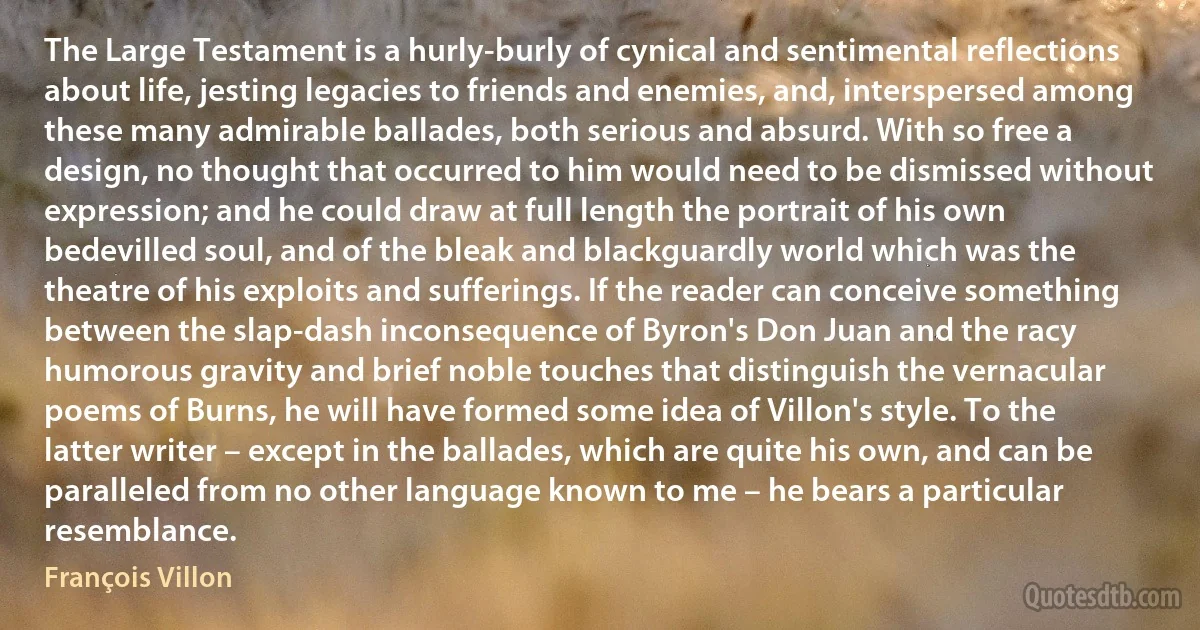
The Large Testament is a hurly-burly of cynical and sentimental reflections about life, jesting legacies to friends and enemies, and, interspersed among these many admirable ballades, both serious and absurd. With so free a design, no thought that occurred to him would need to be dismissed without expression; and he could draw at full length the portrait of his own bedevilled soul, and of the bleak and blackguardly world which was the theatre of his exploits and sufferings. If the reader can conceive something between the slap-dash inconsequence of Byron's Don Juan and the racy humorous gravity and brief noble touches that distinguish the vernacular poems of Burns, he will have formed some idea of Villon's style. To the latter writer – except in the ballades, which are quite his own, and can be paralleled from no other language known to me – he bears a particular resemblance.
François VillonRelated topics
bleak draw free full idea known language large length life need noble portrait quite something soul thought vernacular world Friends BurnsRelated quotes
But someone is bound to question ... by what right I regard as Ideological State Apparatuses, institutions which for the most part do not possess public status, but are quite simply private institutions. As a conscious Marxist, Gramsci already forestalled this objection in one sentence. The distinction between the public and the private is a distinction internal to bourgeois law, and valid in the (subordinate) domains in which bourgeois law exercises its ‘authority'. The domain of the State escapes it because the latter is ‘above the law': the State, which is the State of the ruling class, is neither public nor private; on the contrary, it is the precondition for any distinction between public and private. The same thing can be said from the starting-point of our State Ideological Apparatuses. It is unimportant whether the institutions in which they are realized are ‘public' or ‘private'. What matters is how they function.

Louis Althusser
Ancient scriptures tell us that man is more than the physical body. In fact, we have two bodies: the physical and the astral, or subtle. But we are the soul! According to the ancient Vedic scriptures of India, the size of the soul is 1/10,000 the tip of a strand of hair. It is located in the heart region and is the actual life force. The physical, as well as the astral or subtle body, acts as a covering or costume that the soul wears in its journey throughout the material sphere. As we pass from costume to costume or from body to body through the process known as reincarnation, the impressions of previous lives imprint themselves on the subtle body and are carried with us during each lifetime. In the dream state, activity in the subtle body becomes more dominant than activity in the physical body. Our dream experiences are often impressions accumulated from many lifetimes.

Bhakti Tirtha Swami
We must be prepared to accept the will of God. The Lord permits all sorts of things to happen to us contrary to our will, for if we always have it our way, we will not be prepared for the Kingdom of Heaven. Neither heaven nor earth will receive those who are self-willed.
God has a Divine plan for each one of us, and we must submit to His plan. We must accept life as it is given to us, without asking, "Why me?” We must know that nothing on earth or in heaven ever happens without the will of God or His permission. We must not become too engrossed with our hardships but concentrate on preserving our inner peace.
Even when we are praying for something, we are trying to force our will instead of accepting God's. All hardships and sorrows that God sends us are necessary for us, but we do not understand this when we are young. When we are older, then we understand that this is the way God shows His love for us.

Tadej of Vitovnica
The bleak and yet so intimate nature of the mountains has had an enormous impact on the painter. It has deepened his love for his subjects and at the same time purged his vision of everything that is secondary. Nothing inessential appears in the paintings, but how delicately every detail is worked out! The creative thought emerges strongly and nakedly from the finished work. Kirchner is now so taken up with entirely new problems that one cannot apply the old criteria to him if one is to do justice to his work. Those who wish to classify him on the strength of his German paintings will be both disappointed and surprised. Far from destroying him, his serious illness has matured him. Besides his work on visible life, creativity stemming solely from the imagination has opened up its vast potential to him – for this the brief span of his life will probably be far from sufficient.

Ernst Ludwig Kirchner
The different pieces of evidence did not constitute so many neutral elements, until such time as they could be gathered together into a single body of evidence that would bring the final certainty of guilt. Each piece of evidence aroused a particular degree of abomination. Guilt did not begin when all the evidence was gathered together; piece by piece, it was constituted by each of the elements that made it possible to recognize a guilty person. Thus a semi-proof did not leave the suspect innocent until such time as it was completed; it made him semi-guilty; slight evidence of a serious crime marked someone as slightly criminal. In short, penal demonstration did not obey a dualistic system: true or false; but a principle of continuous gradation; a degree reached in the demonstration already formed a degree of guilt and consequently involved a degree of punishment.

Michel Foucault
